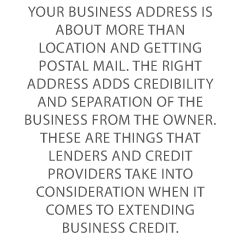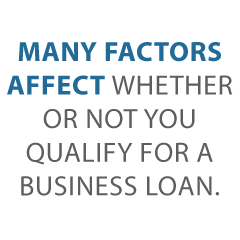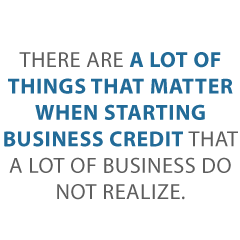
Why Your Business Address Matters
It matters for a lot of reasons. However, most are surprised to find your business address can actually affect your ability to get funding for your business. You always have to put your business mailing address on funding applications, right?
Your Business Address Can Affect Credit Decisions
Still, what most do not realize is that underwriters and credit providers actually take the business address into consideration when it comes to approval decisions. It’s not just about where your business is located.
For example, if your business mailing address is the same as your personal address, they are going to ask a few questions. It’s not necessarily a bad thing to use your home address, especially if it is a physical street address. But, be prepared for them to look deeper if this is the case.
What Works and What Doesn’t?
The really big issue is if your business address is a P.O. Box or something similar. A business mailing address needs to be a physical address, as in a real street address, where you can receive mail.
For most credit providers, a virtual business address can serve this purpose, though there are some that do not like a virtual office address. That’s something to consider before you choose to use a virtual mailing address.
It’s also important that your business address is consistently listed the same everywhere. It has to match exactly on all documents, right down to every last period and ampersand.
That’s one of many reasons it’s good to choose the right business address option in the beginning. The less you have to change it, the fewer chances there are for mistakes.
Let’s dig into this topic a little deeper.
How Do You Build Business Credit With a Business Mailing Address?
Your business address can affect your ability to build business credit. It starts with the business name, as of course that is a part of the business address. Make sure the name you pick does not indicate a risky business.
If you are in a business that some lenders consider to be risky, just leave that out of the name. Just name it “Bob’s” instead of “Bob’s Gas Station.”
Also, the company has to be a corporation. This can be one of those red flags a home address can throw up. Many sole proprietors and partnerships use a home address, so they are likely to look more closely at your business entity.
Your business address is about more than location and getting postal mail. The right address adds credibility and separation of the business from the owner. These are things that lenders and credit providers take into consideration when it comes to extending business credit.
Why Can’t a PO Box or Mail Box from the UPS Store Work as a Physical Address?
While you can receive postal mail and packages at a local post office box or other similar address, it’s not enough. Just receiving mail doesn’t turn PO boxes into physical space. It’s got to be an actual physical address.
Some lenders and credit providers will disqualify you as soon as they see anything other than a real street address on an application.
Considerations When Using a Home Address for a Business Address
Of course your home address is a physical space that has a real street address. Your business can receive postal mail and packages there. However, here are some drawbacks to consider before you use your personal address as your business address.
For one thing, home based business owners that use their home address won’t be able to keep that address private. Of course, it isn’t hard to find someone’s address anyway. But, you should still take this into consideration if you are trying to decide whether to use your home address as your business address.
Furthermore, while a business owner might not often use their home office for anything more than work, there is always the chance that you may need to have a face to face meeting. A kitchen table probably won’t project much of a professional image.
There is a value to having a separate business address. Depending on the type of business, you are likely to have to move out of your home as you start to grow and expand anyway.
Can a Virtual Business Address Work?
It is possible to run a business out of your home, have an actual physical business address, and not use your home address. The solution is a virtual business address.
A virtual address for your business does count as an actual mailing address. When you use a virtual business address, you have access to a virtual mailbox. It is a real mailbox at a location other than the post office.
Virtual business addresses with access to a virtual mailbox can offer more benefits as well. For example, a virtual office address service may offer access to both work space and meeting spaces. This will avoid having to meet with clients or customers in your home.
Receiving packages and important documents in a virtual mailbox such as this may be more secure that having them delivered to your home as well. Not only is there usually someone there during the day, but some virtual address services have 24-hour security.
It’s also more secure and professional looking to have clients meet you in this type of space, even if it is a shared space in a virtual business address building, than to have them at your home.
In addition to mailbox services and workspace options, sometimes a virtual business address service will offer receptionist and message services. That means, if needed, you can have them take calls and messages for your business and pass them on to you.
Downsides to Using a Virtual Address as Your Business Address
One big issue is that a corporation or a limited liability company will need a registered agent. While fine for receiving business mail, virtual offices do not work well as a registered agent address.
In addition, there can (and often are) multiple business addresses on the same site with a virtual office address. Depending on how much mail you get there, you may find you need to chase down your business mail if it ends up in the wrong hands. This type of set up makes it super easy for the post office to make a mistake in delivery.
When it comes to funding, we know of at least one credit provider that will not accept a virtual business address. So, while in some cases the benefits outweigh the drawbacks, it is possible this type of mailing address could prevent you from getting funding in some cases.
Virtual Business Address Providers
Different areas have various options when it comes to a virtual business address. You’ll have to choose based on what is available that offers what you need. Do you just need to keep your home address private? Are you looking for office space to use to meet with business contacts? Do you want the option of having them forward mail to your home?
Here are three virtual office providers we love:
What is the Right Type of Business Address for Your Small Business?
The fact is, your business address is about more than a place to receive packages and other mail. It’s about more than the location of your business. The address listed as your business address can make a big difference when it comes to getting funding and building business credit.
Consistency is Key
Whether you are a new business or just have a new address for your business, make certain it is listed exactly the same everywhere. That means on every document, every piece of marketing material, your website, and all applications.
A Separate Physical Location is Best
If you have a business location that is separate from your home, use that address. That is the preferable option. If you have a home based business, virtual offices can work well in most cases, though there may be a few cases where a lender or credit provider will not accept it.
Your Home Address CAN Work in a Pinch
Using your home address can work as well, if you are not worried about privacy issues, do not need to hold meetings, and do not think you will outgrow the space.
A Post Office Box Is Not an Option
What is absolutely not an option is a P.O. box number or something similar. Though they are easy access and seem like an easy solution for home based businesses or new business without a location yet, and they work well for personal use, they are not an option for a business address if you ever intend to build business credit and access funding.
The post Why Your Business Address Matters appeared first on Credit Suite.






